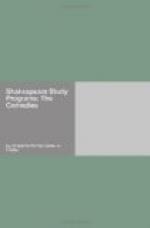The King does not invite the Princess to his Court, and declares he will not violate his vow. Nevertheless he does do so. In what respect? Boyet’s observation of him goes still farther. What is this? And how does it seem to be justified? Is Boyet’s conclusion that “Navar is affected,” more a means of telling the Audience what is about to happen, than comment on what is to be seen? Or is it of use to show the Actor of the King’s part how he must bear himself? How does it fit with the name and scheme of the Play that Boyet who thinks the King has already fallen in love should be called Cupid’s grandfather?
QUERIES FOR DISCUSSION
Why does the Princess discount Boyet’s remarks and accuse him of joking? Does she give any clew to her own feelings?
ACT III
THE CLOWN AS A LETTER-CARRIER
Why is it in keeping with the Play that Berowne should be the first of the Lords to be foresworn?
In making Armado the keeper of Costard, the Clown’s breaking of the vow has already been satirized by the King’s own act. Armado now takes his next turn at making Costard’s sentence a hollow mockery by sending him as a messenger to Jacquenetta. How is this first letter-carrying made to lead to a second, doubling the mockery and promising new confusions?
Has Moth anything to do with the scheme of the Play?
Who is the “Boy” of whom Berowne speaks repeatedly in his speech concluding this Act? What is the bearing of the reference to him upon the Play?
How is the joke of the rhyme in which the Boy got the better of his Master by selling him the “Goose” to be explained? It is commonly supposed that the interpolation from the Quarto, i.e., the lines put between brackets in the “First Folio Edition” (p. 31) are necessary. It is better however, to leave them out, as they are left out in the Folio text, if it is understood that the Boy Moth, repeats ll. 91-92, after Armado has said them. Then Armado begins the “lenvoy” with the intention that the Boy will also repeat that and that being the end, turn the laugh on himself by calling himself the Goose. But the Boy is too clever. He says it ends where it should. Costard declares the Boy has sold him, and both laugh to the bewilderment of Armado. If the Page added the “lenvoy” as the Quarto puts it the joke would already have been turned against him. The explanation has to be very elaborate and the poor little joke is too thin to stand it, if both texts be followed. It is easy to see that the repetition by the Page of ll. 91 and 92, on the stage, confused the hearer who set it down for the publisher of the Quarto, and also that the repetition would be a part of the stage business and the lines might not appear twice therefore in the MS. of the Play itself. The question growing out of this is—Ought not the bracketed part of the text to be left out?




